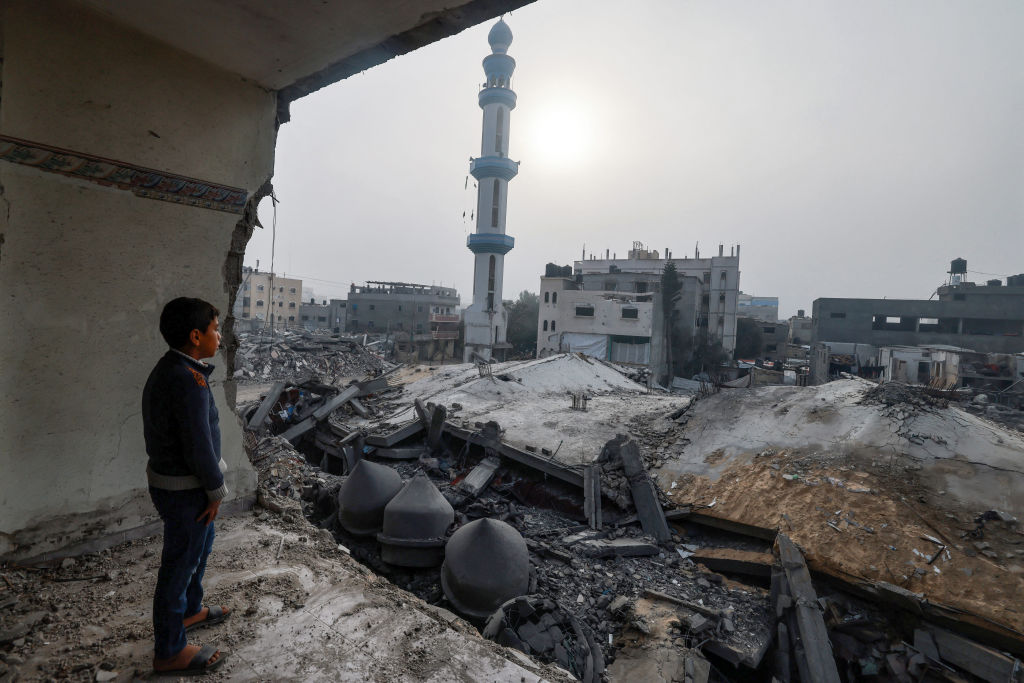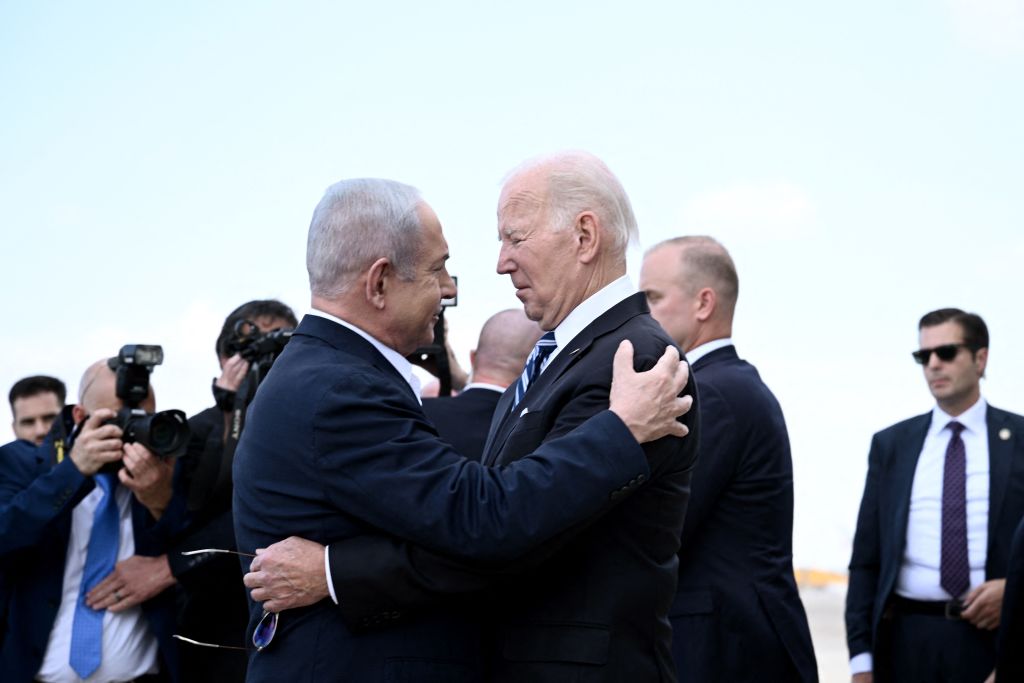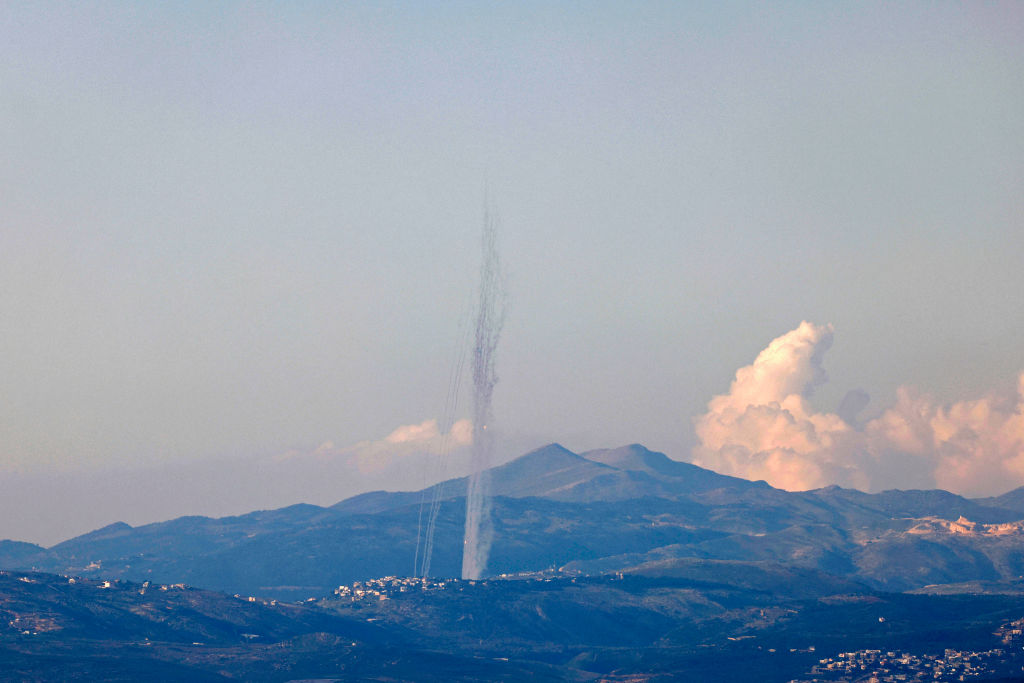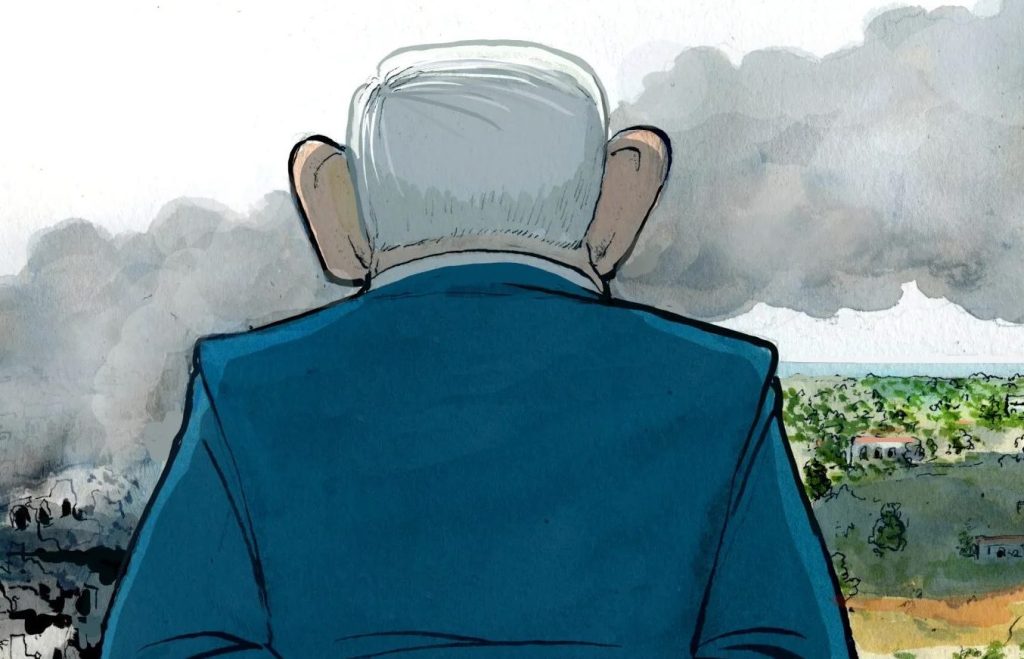Jerusalem
After midnight on Thursday is dead-time for the Israeli media. The weekend editions have gone to print (newspapers don’t come out on Shabbat) and the Friday night TV news shows have been pre-recorded. The country’s journalists are yearning for respite from a long week covering the war. Benjamin Netanyahu chose that black hole of news, 2 a.m., last Friday, to leak his “Day after Hamas” plan for post-war Gaza.
There was no speech. No briefings. Just a page and a bit, double-spaced, presented to his cabinet for discussion.
The plan has not been designed to end the war in Gaza. It is about Netanyahu’s own political survival
But the plan is not a plan. What is being presented as Netanyahu’s — or even Israel’s — idea for the future of Gaza is simply a list of twelve “principles,” divided into “immediate time-range,” “the mid-term” and “long-range.” These headings give the impression of thought-through stages but on inspection, they’re absurdly vague, even contradictory.
The first “immediate” principle is not even immediate. It announces an intention of “continuing the war” and “preventing a threat from the Gaza Strip over time.”
The first “mid-term” principle is to maintain Israel’s freedom to operate in Gaza “without a time limit.”
The whole document continues in this vein. There are no time limits or milestones and the targets are intentionally vague. One of the aims is the “complete disarmament of the Gaza Strip of all military capability, beyond what is necessary for keeping public order.” No Israeli security expert believes that it’s possible to remove the entire military arsenal of Hamas in Gaza, even if Israel had years to do the job. The only thing which would keep Hamas from rearming would be some sort of armed peacekeeping force, which in reality would mean a permanent Israeli military presence.

Likewise, the aims of having “civil management and responsibility for public order based on local elements with managerial experience” and a “comprehensive deradicalization plan in all religious, educational and welfare institutions in Gaza” are unrealistic without a strong Palestinian government. There is a reason Hamas has controlled Gaza with an iron fist for more than sixteen years. It is a homegrown organization that was founded in Gaza nearly four decades ago. Only a Palestinian alternative can take its place, but not once in the document is there mention of the only viable candidate for the job: the Palestinian Authority.
“We all know that Netanyahu is a notorious procrastinator,” says one Israeli official who has in the past been left for weeks waiting for urgently needed prime-ministerial decisions. “But this was extreme even by his standards.” Israeli generals have been grumbling for four and a half months that they need a clear strategy so they can plot out the next stages of the war and its aftermath. The twelve principles for the “Day after Hamas” give them almost nothing to work with. This is not to say that the generals are in favor of ending the war immediately: they want to continue striking at what remains of Hamas’s military formations in Gaza, while pressuring its leadership to release the Israeli hostages snatched on October 7. However they also need a realistic plan of action they can stick to — and, vitally, one which has an exit strategy.
Netanyahu’s paper contains no exit strategy. It doesn’t stand up to even the lightest scrutiny, which is why there was no weekend press conference. Neither was the “plan” presented to the Joe Biden administration, who are anxiously trying to push Israel towards a temporary ceasefire agreement, to be agreed before the month of Ramadan. The idea is that this ceasefire agreement will include the release of some of the 134 Israeli hostages still being held by Hamas in Gaza. On Monday night, Biden said he hopes the ceasefire will be secured by the end of the weekend: “My national security advisor [Jake Sullivan] tells me that we’re close, we’re close, we’re not done yet. My hope is by next Monday we’ll have a ceasefire.”

What was the document for, if it provided no useful plan? Its sole purpose was in fact just to keep the ministers of Netanyahu’s fragile cabinet around the table. The reason it doesn’t mention a role for the Palestinian Authority is because that would push out the far-right coalition members who are hoping to eliminate any semblance of Palestinian sovereignty. It doesn’t specifically mention a permanent Israeli presence in Gaza either, for fear of pushing out the moderates. Above all, it’s not designed to end the war in Gaza. It is about Netanyahu’s own political survival.
Not solving the war in Gaza means also not solving the situation on Israel’s border with Lebanon. This is a war, too (though it’s not acknowledged as such), with Hezbollah daily firing on deserted Israeli towns and villages and Israel responding with targeted air-strikes on members of Hezbollah and other affiliated terror groups.
“None of the three main parties involved, Israel, Hezbollah and Iran, want a war now in Lebanon,” an Israeli security official tells me. “If anything, as time goes by the desire for a war has gone down. Everyone sees the situation in Gaza and understands that it serves no one’s interests to do the same over again.” But, the official points out, Israel has to respond to Hezbollah rocket fire and find a way to deter the group from operating close to Israel’s border. “Hezbollah needs a way to climb down without losing face. Netanyahu doesn’t have a plan for that either.”

The stalemate on Israel’s northern and southern borders serves Netanyahu well politically. As long as there’s fighting and the high risk of escalation, the impetus for political change in Jerusalem is subdued. No one within Likud is going to launch a leadership coup against him. The other parties of his coalition won’t risk replacing the man who has given them their most powerful ministerial positions or showered them with billions in state subsidies for their communal interests. And an early election, which he would lose, won’t be held because many of those who are anxious to replace him do not want to be seen as sabotaging national unity at a time of war.
“Netanyahu has lost the trust of the Israeli public and that seems to be irrevocable,” says one former aide of the prime minister. “But the same Israeli public which wants to replace Netanyahu doesn’t want right now another toxic and divisive election campaign while the soldiers are still fighting and dying on the front. They’ve had enough elections in recent years. That contradiction is what Netanyahu is using to stay in office.”
Netanyahu’s rivals are aware of this terrible stalemate as well. A senior member of National Unity, the party led by Benny Gantz — who agreed at the start of the war to join an emergency coalition on a temporary basis — said this week: “This is an awful government with extreme ministers and a weak prime minister. We have to leave it. But we can’t leave it. If we’re not there, who will push for a hostage agreement? The public doesn’t want us to leave the government because they’re scared of the thought of Netanyahu and the far-right leading the country on their own.”
Many see Netanyahu as a warmonger. But this couldn’t be further from the truth: Netanyahu has never launched any wars. He is risk-averse and his own military service fifty years ago in a small secretive commando unit left him with little faith in the capability of conventional armies to deliver the required results. He didn’t choose to start the war in Gaza. The October 7 attack by Hamas sucked Israel in. That is now Israel’s reality. The status quo is one of warfare in Gaza.
Netanyahu’s approach has always been to accept the status quo and try to make it work for what he sees as Israel’s interests. That’s why when he first became prime minister back in 1996, he didn’t cancel the Oslo Process with the Palestinians against which he had railed as leader of the opposition for three years. Instead, he tried to freeze it, preventing any progress towards a two-state solution but leaving the Palestinian Authority intact, ruling semi-autonomous enclaves and serving as a security sub-contractor for Israel.
That policy failed in 2007 when Hamas took over one of those enclaves, the Gaza Strip, in a bloody coup against the Palestinian Authority. Netanyahu was leader of the opposition at the time. Two years later, when he returned to office, he once again chose the status quo.
‘Netanyahu has lost the trust of the Israeli public and that seems to be irrevocable,’ says one former aide
In the election campaign he had promised to “topple the rule of Hamas in Gaza.” Once elected, Netanyahu acted to preserve Hamas’s hold on Gaza. Instead of trying to restore the Palestinian Authority there, he argued that the situation in fact worked in Israel’s favor. With Palestinian territories split between the dominion of two warring Palestinian factions, one of them a terror organization proscribed in the West, it would be much harder for the international community to pressure Israel to make concessions to the Palestinians.
In the same way that Netanyahu has spent so many years threatening to strike at Iran’s nuclear installations, but has never acted decisively on that front, his bombastic rhetoric against Hamas was always a cover for sticking to the status quo. He is confronted with a new reality that he did not choose.
Israeli forces are engaged in a Sisyphean and bloody campaign to eradicate Hamas inside Gaza. And, as always, Netanyahu’s political instincts are telling him not to make any dramatic changes. Unlike his most extreme far-right coalition partners, he doesn’t want to build Israeli settlements in Gaza. That would break the status quo as well. But continuing a low-level state of war for the foreseeable future — with vague targets that can never be realized — works well for him. It provides him with forceful soundbites promising “total victory.”
Israeli veterans who spent long years fighting in Lebanon in the 1980s and 1990s before Israel finally withdrew from the “security zone” there in 2000, warn against getting “bogged down” again, this time in Gaza. Israel’s allies try to draw up plans for both temporary and permanent ceasefires which would allow it to retreat with security arrangements in place. They fail to grasp that getting “bogged down” in Gaza is what Netanyahu actually wants. That is the plan.
This article was originally published in The Spectator’s UK magazine. Subscribe to the World edition here.


























Leave a Reply